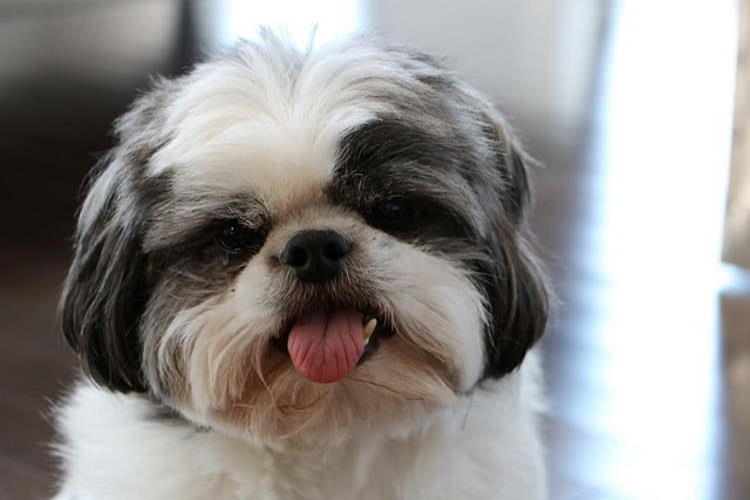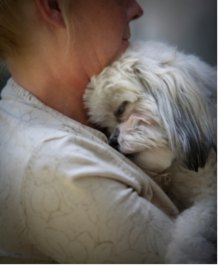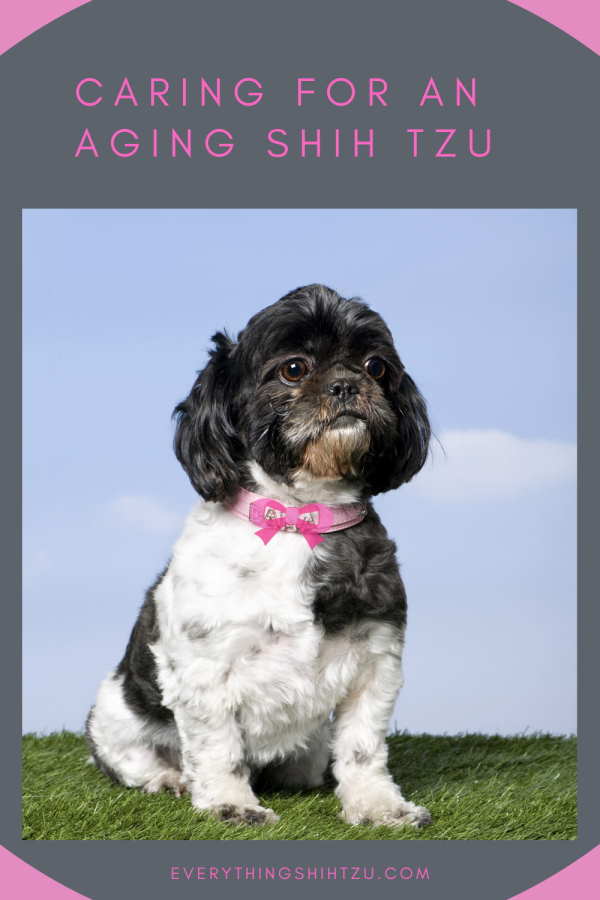The Complete Guide to Caring for An Aging Shih Tzu
By Everything Shih Tzu July 28, 2019 | Updated August 5, 2021
There's no doubt that if you've been blessed with a Shih Tzu companion then you spend each day gazing into those big, beautiful eyes and enjoying the antics of your playful pup.
One day, however, you realize those eyes appear a little cloudier than usual, and your canine pal has a little less pep in her step.
Your Shih Tzu is growing older, and it's time for you to shift gears into caring for an aging Shih Tzu.
A Shih Tzu is considered a senior dog between 9 and 10 years of age. An aging Shih Tzu requires special care and has unique needs, including vet visits every 6 months.

It is important to pay close attention to your Shih Tzu's weight, diet and exercise habits, as well as any changes in behavior that may occur.
No one wants to see his best friend slow down, and as the aging process begins, you probably can’t help but think about how your time together is growing shorter and more precious.
It’s essential, however, to view this period of your dog entering her senior years as one where things need to be done a little differently, instead of as one where time is short.
Remember, the top end of a Shih Tzu’s lifespan is approximately 16 years, so your pup and you can still make many memories together; you just need to know how to properly care for your Shih Tzu as he grows older.
What Are the Signs of Aging in Your Shih Tzu?
Unsurprisingly, many of the telltale signs of growing older that humans experience can also be identified in your aging Shih Tzu.
Not all senior pups will display every sign of aging, and the change is more of a slow transition, but it's a safe bet that as your Shih Tzu gets up in years, you'll start to notice some of the following indicators:
- Not Listening
Do you notice that your dog doesn’t seem to listen to you anymore? Once upon a time, you may have delivered a command and your faithful pup obeyed immediately, but now you notice that he seems less than interested.
The issue here is not necessarily one of defiance or the fact that your dog thinks he’s too old for this sort of silliness, it’s most likely due to a change in your dog’s hearing.
Hearing loss is a big indicator of aging, and as your Shih Tzu gets older, his hearing may start to fade a bit.
- Weight gain
Weight gain is inevitable if a proper diet and exercise routine are not followed consistently.
Even humans get to experience the joy of weight gain as they get older if they do not adjust their eating habits and make it a point to keep their bodies moving.
This unpleasant phenomenon is mainly due to the fact that as a dog ages, his metabolism slows down, just like in humans.
If your dog continues to follow the same diet plan as he ages, then you might notice that he starts to gain weight.
This is because as your dog ages, he slows down and his dietary needs change.
Your pup doesn’t require the same amount of calories as he once did, plus he won’t metabolize food as well as he did when he was young.
This change, coupled with less physical activity, results in weight gain.
- Slowing down
Shih Tzu are known for their lovable temperament and constant desire to play.
As your pet grows older, though, you’ll notice that she isn’t as quick to jump and play as she used to be.
The older your Shih Tzu gets, the less she will engage in physical activity.
Your pet’s stamina decreases as she ages, and she won’t have the same energy she did when she was younger.
This will present itself in reduced playtimes, shorter walks, and you may notice that your pup is sleeping more during the day.
- Hair loss
As your Shih Tzu ages, her skin dries out because it can’t retain moisture as well as it could when she was younger.
Dry skin equals itchy skin, and the health of your dog's coat is directly related to the health of her skin.
If her skin is dry, then her coat will start to thin and dry out as well, and her hair can become brittle.
When her coat reaches this point, you may start to notice that some of your Shih Tzu's hair starts to fall out in varying degrees.
- Lumps
Lumps can be a startling sign of aging. When you first discover a lump on your Shih Tzu, your initial reaction might be one of panic.
People often associate lumps with a possible sign of cancer, and the first instinct is to fear the worst-case scenario.
It is definitely important to get any lump that you notice on your Shih Tzu examined by a vet, however, many times these lumps are harmless and just come with the territory of old age.
In fact, many vets will simply call them, “old age bumps.”
- Difficulty getting up
You might notice that as you get older, you feel a little stiffer when you stand up after being seated for some time.
You don’t seem to jump up as fast as you used to, and your joints aren’t always in agreement with the rest of your body.
Well, your Shih Tzu experiences similar troubles after lying down or sitting for a while.
You may notice it takes her longer than usual to stand up after she has been resting.
This can be a sign of arthritis in the joints (mainly the hip, knees, and leg areas) or it could be a general stiffness as your pup doesn’t use her muscles as much anymore.
However, if you notice that she cannot stand at all, or her backside is dropping, you need to get her checked out by a vet immediately as this can be a sign of a more serious condition.
- Cloudy eyes
As your dog ages, his hearing isn’t the only one of his senses that will start to fade.
Your dog may potentially experience some loss of vision as well. As his eyes grow older, you might notice that they appear cloudy.
He could develop cataracts, or it might just be that his ability to see in the dark is greatly reduced.
Some pups, as they reach their later years, will simply stop walking in their tracks as soon as the lights go out because they basically become blind.
Cloudy eyes can be considered a normal, expected sign of aging, but they should be checked out by your vet to rule out more serious conditions.
- Frequent bathroom breaks
When your Shih Tzu was young, he may have been able to go a whole workday without needing a potty break.
You could take him to potty in the morning, and then he would be good to go until you got home from work to take him for his walk.
However, as dogs get older, they just don’t have the same bladder control that they once did.
Your senior Shih Tzu will need more frequent potty breaks.
If your schedule keeps you away from home for most of the day, then you will need to consider your dog’s weaker bladder and provide proper accommodations to your pet.
- Bad breath
It may be true that even a young pup doesn’t have the best smelling breath around, but unless you have been extremely vigilant with dental care for your dog, then the odds are good that your aging pal's teeth will not be in the best of shape.
Older dogs are prone to lose teeth, have loose or cracked teeth and experience gum issues. Any and all of these factors can lead to a serious case of doggy breath.

What Can You Expect As Your Shih Tzu Gets Older?
In addition to the signs of aging listed above, there are a few other things that you can expect as your Shih Tzu gets older.

Your pup will undergo several behavior changes as she ages, such as a desire to sleep for longer periods of time and appetite changes.
Some dogs want to spend more time with their owners and other humans, while other dogs would rather retreat to a cozy nook to be left alone for long stretches of time.
The latter is especially true for older dogs that live in households with young children or puppies.
Often senior dogs tend to lose patience for these energetic housemates.
It’s important to remember that all of these changes are gradual. In fact, sometimes, they happen so slowly over time that they are not picked up on by many owners.
If you do notice some significant, dramatic changes in your dog’s behavior, such as not eating at all for more than a couple days, acting extremely frightened or being overly clingy, then these could be signs of a health issue and should be evaluated by a vet.
Are There Health Conditions Specific to Older Shih Tzu?
An older Shih Tzu is, of course, prone to the same breed-specific potential health issues that exist for all Shih Tzu.
However, as dogs get older, their immune systems weaken, which makes them more susceptible to these different conditions.
As Shih Tzu get older, though, they can develop the canine equivalent of dementia, known as Canine Cognitive Dysfunction.
There are a few symptoms that can point to dementia, however, these signs can also indicate a host of other issues, so if you notice any of them, it is best to have your vet evaluate your dog.
The signs that can potentially be a clue that your Shih Tzu has dementia are:
- Appearing confused and not responding to her name
- Pacing and having difficulty finding her way around the house
- Acting depressed
- Trouble following simple commands
- Staring into space
- Becoming easily startled
- Decreased desire to play or interact with humans or other animals
- Appetite changes
Again, remember that any of these signs can indicate another condition, so always have your pet checked out by your vet.
If dementia is found to be the cause, there is medicine available that can greatly improve your Shih Tzu’s quality of life, but it will not cure the disease.
How To Care for An Aging Shih Tzu
Now that you know what to expect as your Shih Tzu gets older, you need to know the best way to take care of your old buddy so that you and your dog can both fully enjoy your pup’s golden years.
Here are the main points to pay attention to as your Shih Tzu gets older, so that you can properly take care of her:
- Provide Adequate Exercise
Even though your dog’s desire and need for exercise will decrease as she gets older, it is still important that she get some physical activity.
You just need to be super vigilant with your observations of how your pup is handling her walks.
You can shorten the length of her walks, and if you notice any limping, wheezing or other issues, report them to your vet.
If your dog’s lack of exercise leads to weight gain, then you may need to consider an alternative food for weight control or decrease the serving size as she will not need as many calories.
- Provide a Nutritious Diet
A healthy diet is always important, but it is essential that your senior dog is getting all of her nutrients and in the proper portions.
As mentioned earlier, decreased physical activity can lead to weight gain, so sometimes switching to a dog food designed for weight control or to food specifically created for senior dogs, can help keep your Shih Tzu’s weight in check.
If your dog has sensitive teeth, or other issues with her gums or teeth as she ages, then you can soften her food with warm water to make it easier for her to eat.
Another item to consider as part of a healthy diet are supplements.
For example, as your dog starts to experience dry skin and brittle hair and nails as she ages, an Omega-3 supplement can help keep her nails, skin, and coat healthy.
Your vet may also recommend supplements to help your pet with her joints and other issues associated with aging.
- Keep Your Shih Tzu Warm
Older Shih Tzu cannot regulate their internal temperature as well as younger pups. Shih Tzu, no matter what their age, have difficulty handling very warm weather, so you probably have already gotten used to how to make accommodations for your pup so she doesn’t get overheated.
Older Shih Tzu, however, have trouble adjusting to chilly weather as well, and the fix for this is pretty simple -- a soft, comfy sweater. Your Shih Tzu can be warm and stylish at the same time!
- Make Regular Vet Visits
You probably already take your pet to the vet once a year for her regular check-up and vaccinations.
However, a senior dog needs to have routine health visits every six months.
This is something that is often ignored by many owners, but it can make a huge difference in the quality of your dog’s life and how long she lives.
In addition to the routine checks performed at wellness visits, your vet will check your senior pet for any issues with her hips, knees, and other joints; liver, kidney and heart function; and for hearing and vision loss.
More frequent vet visits are necessary because as a dog ages, her immune system weakens, and infections and other issues can attack faster and develop more quickly.
Therefore, more frequent vet visits will ensure that any health concerns are detected as early as possible.
Some owners get stuck in the ironic cycle of not taking their older dog to the vet because they are scared about what the vet might find, but in doing this, the owner increases the odds that the dog will develop a problem, or run the risk of an existing problem becoming worse.
Parasites become more of a danger to older dogs, so talk to your vet about verifying that your dog is on the proper parasite prevention medicine and that your vet visits include regular checks for parasites.
It is also critical to have your dog’s teeth checked and cleaned regularly, as teeth and gum problems have been shown to lead to many other health issues.
- Accommodate Your Aging Shih Tzu’s Needs
The biggest change you will face as your Shih Tzu ages is all of the little tweaks you will need to make to accommodate her fluctuating needs as she gets older.
It will be imperative that you keep a keen eye on your pup to see what trouble she seems to be having so that you can make the proper adjustments.
For example, if your dog is having hip or joint issues and jumping is painful or hard for her, then you may want to invest in doggy steps or a doggy ramp to help her get up and down from any high places that she is used to going, such as the sofa or your bed (if you let your canine pal sleep with you, of course.)
If your dog is having difficulty hearing, then turning on a light to catch her attention can be a small tweak that you make.
If your Shih Tzu is having trouble seeing, then make it a point to “puppy-proof” daily.
In other words, keep your furniture in the same position, don’t leave random items lying around that can hurt or trip up your pup, and keep pathways clear.
If your older dog is having trouble holding her bladder for long periods of time, more frequent potty breaks are helpful, but they are not always practical.
A doggy diaper can help keep things under control, or you can train your pup to use an indoor potty area that you set up with training pads or other products designed for indoor doggy “bathrooms.”
Overall, you and your aging Shih Tzu can continue to enjoy many happy years together.
Your job as a caring and responsible owner is to make sure that you know how to properly care for your senior pet.
It is up to you to get her the proper health checks and make any needed adjustments to help your pet adapt to the changes that she is experiencing.
If you are ever in doubt about what to do for your dog, then talk to your vet!
In the meantime, check out the rest of our site to find great tips and resources about Shih Tzu and how to be the best owner that you can be!




